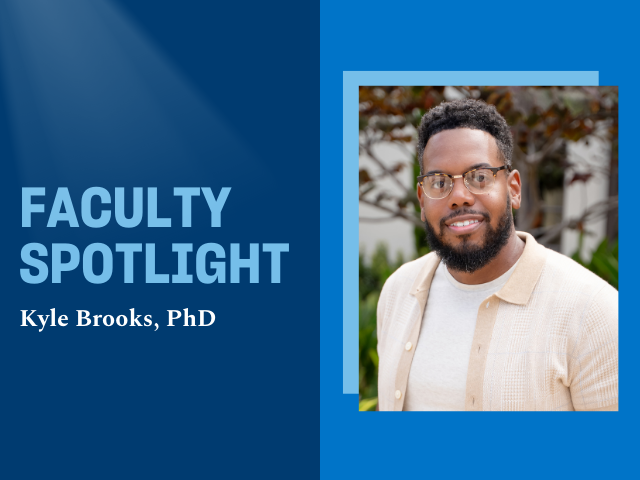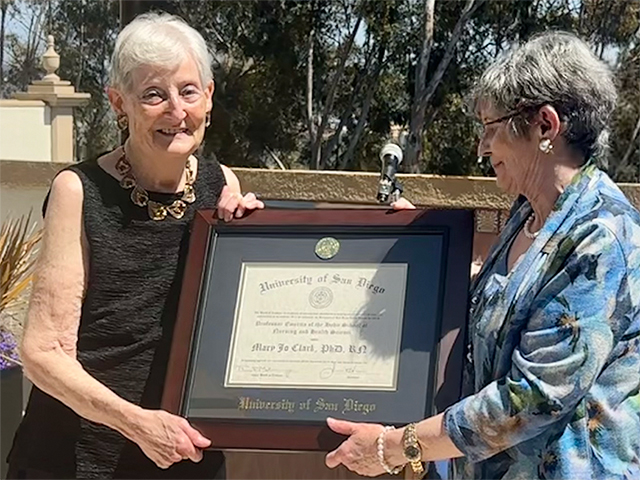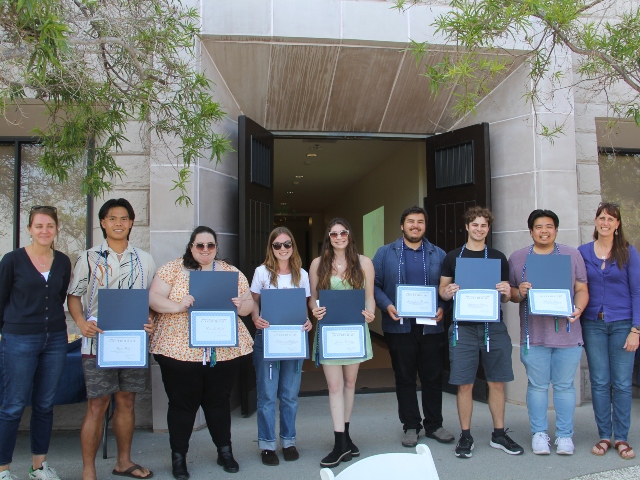Faculty Spotlight: Q&A with Kyle Brooks, PhD

The USD College of Arts and Sciences (the college) hired 14 new faculty members in three distinctive themes – Borders and Social Justice, Technology and the Human Experience and Climate Change and Environmental Justice – this past fall. As part of the university's commitment to academic excellence, the college endeavored to assemble a cohort of teacher-scholars who offer a strong contribution to the excellence of USD through teaching, scholarship, service and collaboration.
This spring semester, the college is featuring each new faculty member with a Q&A series every week. Each spotlight highlights their professional journeys, academic expertise, research and their goals for fostering academic and personal growth within the USD community.
Learn more about Assistant Professor of Theology and Religious Studies Kyle Brooks, PhD, his background and his passion for research and teaching in the Q&A below.
Cluster-Theme: Borders and Social Justice
Q: Please share your name, title, department and the subjects or courses you will be teaching at USD.
A: My name is Kyle Brooks, and I’m an assistant professor in the Department of Theology and Religious Studies and Africana Studies at USD. Some of the courses I have taught and will be teaching include Black/Womanist Theologies, Theologies of Martin Luther King and Malcolm X, Fundamentals of Africana Studies, Literature, Theology and the Religious, Religion and Hip Hop, Jesus of Hollywood and a special topics course called Black Religious Leaders.
Q: What key experiences have shaped your career and where you are today?
A: One experience that stands out is a course I took as a master’s student, Contemporary African-American Poetry, with Elizabeth Alexander, a renowned poet who read for the 2009 presidential inauguration. Her class was the space where I realized I wanted to be a university professor. My life and career path have been profoundly shaped by the life and work of my late advisor, Dr. Dale P. Andrews. He was a tremendous mentor who taught me never to sacrifice my humanity and well-being for the sake of professional gain.
Q: What sparked your interest in the Borders and Social Justice cluster, and what drew you to this particular focus? How are you contributing to that focus in your work here?
A: I have long been interested in the ways human beings mark, define and shape territories and lineages. As a scholar of religion and Africana studies, this holds specific meaning for me.
Borders are not just physical constructs but social and ideological ones as well. How we shape and define borders reflects our presumptions about how the world should be ordered — politically, religiously and otherwise. My current research deals with the ideological borders of black religious and political leadership and how a certain mythology of “great men” has been interpreted as the driving force of social justice struggles.
Q: What aspects of joining the University of San Diego community are you most excited about?
A: I am most excited by the opportunity to be in conversation with thoughtful and knowledgeable scholars. To me, the point of a university, particularly in a liberal arts context, is to be exposed to a breadth of knowledge and expertise from people striving to clarify our understanding of the world.
It doesn’t hurt to be at a place considered one of the most beautiful campuses in the United States. More importantly, it’s an atmosphere where I have felt embraced and encouraged by colleagues and students alike. This is a place where good work can and does happen.
Q: How do you envision your course curriculum contributing to the academic and personal growth of USD students?
A: I see my courses as an invitation for students to gain foundational knowledge of and critical reflection on the social, political, religious and creative lives of black people in the U.S. and the broader African diaspora. To me, these are not mere historical matters but ongoing and unfolding stories that shape how we interpret the nation (and world) in which we are currently situated.
I want to encourage students to engage in theology, religion and Africana studies, not as course requirements to check off a list, but as vital resources for their intellectual, moral and ethical reasoning and development.
Q: What current research projects are you working on or interested in, and how do they align with your cluster theme?
A: My current book project, Chasing Ghosts: The Politics of Black Religious Leadership, explores how the roles of black clergymen have been understood within the context of sociopolitical movements and freedom struggles. It also examines how sociopolitical imagination has become entangled in “chasing the ghost” of figures like Martin Luther King Jr., who become idealized without being appropriately understood within their context. I believe that the pursuit of social justice is thwarted by reducing the idea of leadership to singular, charismatic figures. My work challenges these limited borders of sociopolitical imagination and asks how we might reconceive the pursuit of social justice.
Q: What’s an interesting or unique fact about yourself that others might not know?
A: I am a musician and used to play electric bass with a lot of bands when I lived in Nashville, Tennessee. Music is a major passion of mine, and if you’re ever in my office, you’re probably going to hear jazz playing in the background.
— USD News Center



